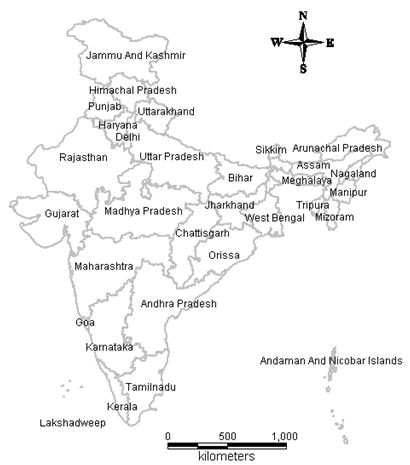 |
Hotspots of solar potential in India
T V Ramachandra1,2,3,* Rishabh Jain1 Gautham Krishnadas1
|
 |
1 Energy & Wetlands Research Group, Center for Ecological Sciences [CES],
2 Centre for Sustainable Technologies (astra),
3 Centre for infrastructure, Sustainable Transportation and Urban Planning [CiSTUP],
Indian Institute of Science, Bangalore, Karnataka, 560 012, India
OBJECTIVE
Main objective of this study is to identify the solar hotspots based on the exploitable potential using high resolution global insolation data from NASA SSE in India across federal boundaries (Figure 3) and agro-climatic zones (Table 2). The power generation with the emission reduction potential of the solar hotspots has also been discussed to understand the prospects of achieving the long term targets of the NSM (national solar mission) considering the techno-economic and organizational aspects in the dissemination of solar power technologies like SPV and CSP.

Figure 3: India with the federal state boundaries
Table 2: Agro-climatic zones in India
| S.No | Agro-climatic Zones | Representative states |
| 1 | Western Himalayan region | Himachal Pradesh, Jammu & Kashmir, Uttarakhand |
| 2 | Eastern Himalayan region | Arunachal Pradesh, Assam, Manipur, Meghalaya, Mizoram, Nagaland, Sikkim, Tripura, West Bengal |
| 3 | Lower Gangetic plain region | West Bengal |
| 4 | Middle Gangetic plain region | Uttar Pradesh, Bihar |
| 5 | Upper Gangetic plain region | Uttar Pradesh |
| 6 | Trans Gangetic plain region | Chandigarh, Delhi, Haryana, Punjab, Rajasthan |
| 7 | Eastern plateau & hills region | Chhattisgarh, Jharkhand, Madhya Pradesh, Maharashtra, Orissa, West Bengal |
| 8 | Central plateau & hills region | Madhya Pradesh, Rajasthan, Uttar Pradesh |
| 9 | Western plateau & hills region | Madhya Pradesh, Maharashtra |
| 10 | Southern plateau & hills region | Andhra Pradesh, Karnataka, Tamil Nadu |
| 11 | East coast plains & hills region | Andhra Pradesh, Orissa, Pondicherry, Tamil Nadu |
| 12 | West coast plains & ghat region | Goa, Karnataka, Kerala, Maharashtra, Tamil Nadu |
| 13 | Gujarat plains & hills region | Gujarat, Dadra & Nagar Haveli, Daman & Diu |
| 14 | Western dry region | Rajasthan |
| 15 | Island region | Andaman & Nicobar Islands, Lakshadweep |
| * Address for Correspondence: | |
|
Dr. T.V. Ramachandra Energy & Wetlands Research Group, Centre for Ecological Sciences, Indian Institute of Science, Bangalore – 560 012, INDIA. Tel : 91-80-23600985 / 22932506 / 22933099, Fax : 91-80-23601428 / 23600085 / 23600683 [CES-TVR] E-mail : cestvr@ces.iisc.ac.in, energy@ces.iisc.ac.in, Web : http://wgbis.ces.iisc.ac.in/energy |
|
| l | l | l | l | l | l | l | l | l |